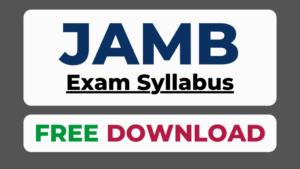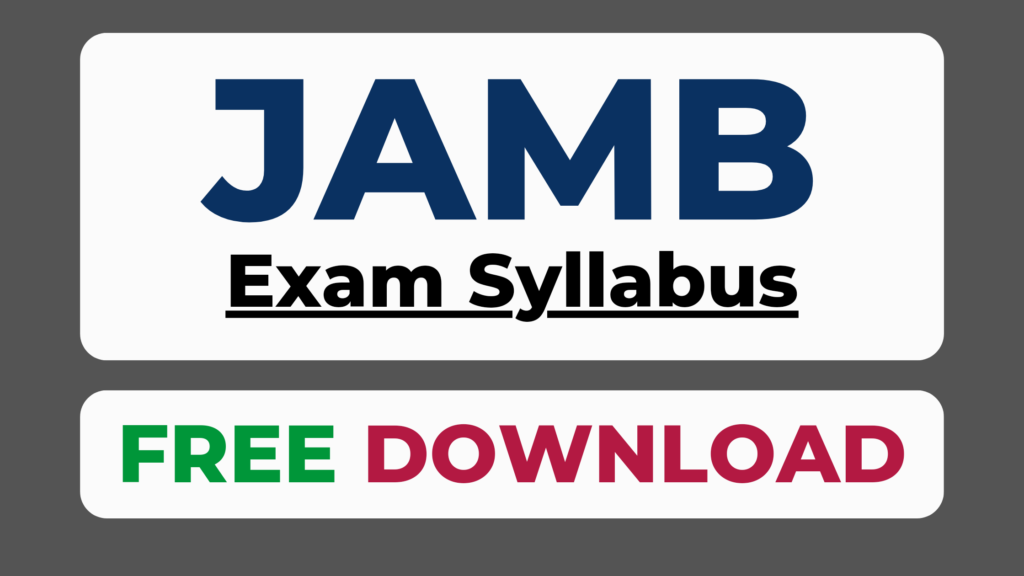The JAMB Igbo syllabus is designed to help candidates preparing for the Unified Tertiary Matriculation Examination (UTME) in the Igbo language. It covers areas of language, literature, and culture, providing a comprehensive guide to help candidates understand Igbo linguistic structures, literary works, and cultural values. The syllabus aims to develop fluency in the Igbo language and an appreciation of its rich literary heritage.
JAMB Syllabus for Igbo 2025 Pdf Download
Below is a detailed outline of the JAMB Igbo syllabus:

Main Topics in the JAMB Igbo Syllabus
1. Language (Asụsụ Igbo)
This section focuses on understanding the structure, usage, and grammar of the Igbo language.
- Igbo Orthography and Phonology (Mkpurụokwu na ụdaume Igbo):
- The Igbo alphabet
- Vowel sounds and consonant sounds (Udaume na Udarị)
- Correct spelling and pronunciation of Igbo words
- Diphthongs and tones in Igbo language (Abụọuda na ụda olu)
- Parts of Speech (Udi mkpụrụokwu):
- Nouns (Aha)
- Pronouns (Mgbasaaha)
- Verbs (Ọrụgụ)
- Adjectives (Njirimara)
- Adverbs (Ntirirị)
- Conjunctions (Njikọta okwu)
- Prepositions (Ntinye okwu)
- Tenses and Sentence Structure (Ahịrịokwu na Amụma Ọnụọgụ):
- Types of sentences (Ahịrịokwu isiokwu, n’aka isiokwu, mkpukwuru okwu)
- Tense usage (Ogeakụkọ, Oge ugbu a, Oge na-abịa)
- Sentence construction and analysis
- Idioms, Proverbs, and Figures of Speech (Nkịtị, Ilu, na Agwa okwu):
- Common Igbo proverbs (Ilu Igbo)
- Use of idiomatic expressions (Nkịtị okwu)
- Figures of speech such as simile (Ife di ka), metaphor (Akwụnyị okwu), and personification (Nka mmadụ na ihe)
2. Literature (Agụmagụ Igbo)
This section focuses on the study of Igbo literary works, including prose, drama, and poetry.
- Prose (Agụmagụ Akụkọ):
- Study of selected Igbo novels and short stories
- Understanding themes, character development, and plot structure
- Literary devices in Igbo prose, such as foreshadowing, symbolism, and irony
Recommended Igbo Prose Texts:
- “Omenuko” by Pita Nwana
- “Isi Akwụ Dara N’ala” by Tony Ubesie
- “Ụkwa Ruo Oge Ya Ọ Daa” by Chiegboka Chukwuma
- Drama (Nka Akwụkwọ Egwuregwu):
- Study of selected Igbo plays
- Themes, character roles, and dramatic techniques used in the plays
- Analysis of conflicts, resolutions, and dialogue in the plays
Recommended Igbo Drama Texts:
- “Ụwa Mgbede Ka Mma” by Emmanuel Ifesinachi
- “Akwụnụkọ Ọnwụ Nwa Mkpụrụobi” by Chinyere Okafor
- Poetry (Abụ Igbo):
- Study of selected Igbo poems
- Identification and analysis of poetic techniques (e.g., rhyme, meter, and imagery)
- Understanding the themes and messages in Igbo poetry
Recommended Igbo Poetry Texts:
- “Abụ Ndi Igbo” by F. C. Ogbalu
3. Culture and Customs (Omenala na Asụsụ Igbo)
This section covers the cultural aspects of the Igbo people, including traditions, festivals, beliefs, and values.
- Igbo Traditional Festivals (Emume Igbo):
- Types and significance of Igbo festivals (e.g., New Yam Festival – Ịwa ji Ọhụrụ, Masquerade Festival – Mmanwụ)
- Rituals and practices associated with festivals
- Marriage and Family Life in Igbo Culture (Ụgwọ ọmụmụ na ndụ ezinaụlọ Igbo):
- Marriage customs and types (Traditional Igbo marriage – Ịlụ di na nwunye)
- Role of family and kinship in Igbo society
- Chieftaincy and Title Systems (Ọdịnala na Ichie):
- Title-taking ceremonies (e.g., Ozo title)
- Role of chiefs and elders in Igbo communities
- Traditional Beliefs and Practices (Ekike Omenala Igbo):
- Beliefs in ancestors (Ndị nna ochie) and spirits (Mụọ)
- Traditional healing and divination practices (Dibia)
- Contemporary Issues in Igbo Culture (Nsogbu dị n’ime ọdịnala Igbo):
- Influence of modernity on Igbo culture
- Issues surrounding the preservation of Igbo language and traditions
4. Translation and Interpretation (Ntụgharị okwu na Nsụgharị okwu)
This section focuses on the translation and interpretation of texts between Igbo and English.
- Translation Techniques (Ntụgharị okwu):
- Translating passages from English to Igbo and from Igbo to English
- Understanding contextual meaning and maintaining the original tone in translations
- Interpretation of Oral and Written Texts (Nsụgharị okwu na omume mgbasa):
- Interpretation of traditional Igbo sayings, folktales, and proverbs
- Listening comprehension and oral interpretation in Igbo
General Tips for Preparing for JAMB Igbo
- Study Igbo Grammar: Be familiar with Igbo grammatical structures, including tenses, sentence construction, and parts of speech.
- Read Igbo Literary Works: Read the recommended prose, drama, and poetry texts thoroughly. Focus on themes, character analysis, and literary techniques.
- Revise Proverbs and Idioms: Proverbs and idiomatic expressions are integral to the Igbo language. Memorize common ones and understand their meanings and usage.
- Practice Translation: Regularly practice translating texts from English to Igbo and vice versa. Pay attention to context and accuracy in meaning.
- Understand Cultural Aspects: Familiarize yourself with traditional Igbo customs, beliefs, and festivals. This helps in answering questions on culture and customs effectively.
Recommended Textbooks for JAMB Igbo
- “Asụsụ na Agụmagụ Igbo maka UTME” by Eze M. O.
- “Omenala na Nkàdụmọdụ Igbo” by F. C. Ogbalu
- “Nchọpụta na Mmụta Abụ Igbo” by Nnamdi Iroegbu
Conclusion
The JAMB Igbo syllabus provides a detailed guide for candidates to study the Igbo language, literature, and culture. By mastering the language’s grammar, engaging with selected literary texts, and understanding the cultural practices of the Igbo people, candidates will be well-prepared for the UTME Igbo examination. Regular practice, reading, and application of the language in daily conversations will also aid in successful preparation.

